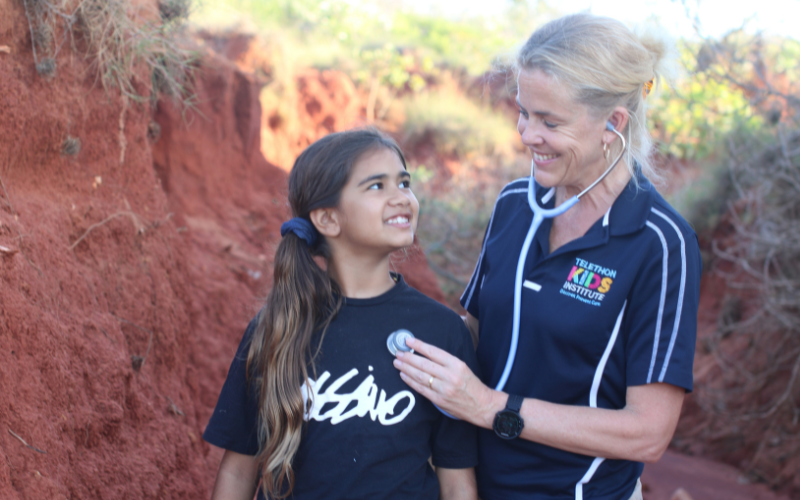
WA researchers will use a $1.97 million Medical Research Future Fund grant to develop a strategy for better follow-up of First Nations children after they’ve been hospitalised for respiratory infections, in a bid to halt the slide into more severe lung disease.
Australian First Nations children have the world’s highest reported rates of acute lower respiratory infections (ALRIs), experiencing higher hospitalisation rates and more severe disease than other Australian children.
One in five First Nations children hospitalised for an ALRI is diagnosed with bronchiectasis – a chronic, debilitating and life-shortening lung disease – within two years of being discharged.
Respiratory researcher and physiotherapist Dr Pamela Laird said this tragic trajectory could be prevented by effective medical follow-up four weeks after discharge from hospital, during which clinicians would screen for and manage persistent wet cough – an early sign of the disease.
Without a clear follow-up strategy many of these children may miss out on important treatment after being in hospital.
Dr Laird said the trial that would be supported by the grant had been conceived in direct response to concerns conveyed by Aboriginal communities.
“Five years ago, we were working with Aboriginal families in the Kimberley,” Dr Laird said. “They expressed concern about follow-up when their children had been admitted to hospital with chest infections.
“They weren’t sure what to look out for and were worried that GPs weren’t always getting discharge summaries.
“While national guidelines recommend Aboriginal children receive medical follow up a month following hospital discharge, this is not widely known and there are not processes in place to facilitate this.
We made a commitment to the community to do something about it. So I am very excited we can now deliver on our promise.
Over the next four years Dr Laird, who is a researcher with the Wal-yan Respiratory Research Centre – a powerhouse partnership between The Kids Research Institute Australia, Perth Children’s Hospital (PCH) and Perth Children’s Hospital Foundation – and a physiotherapist with PCH, will lead a team of researchers to develop and trial an effective, culturally secure follow-up strategy.
The group will work with partner organisations from Queensland and from the Kimberley and Pilbara regions in Western Australia, including Aboriginal medical services that support remote-living First Nations communities.
“Through this trial we hope to increase families’ respiratory health knowledge and medical follow-up rates, improve discharge processes, and help clinicians better manage these conditions in primary care and hospital settings,” Dr Laird said.
“Coupled with this better medical care, a culturally secure, cooperative approach will empower parents to recognise key symptoms and seek help. Hospital clinicians will have improved processes to help facilitate this, which is especially important when so many families live in very remote parts of Australia.
The ultimate aim is to ensure these children don’t slip under the radar once they’re out of hospital, and in doing so reduce the burden of chronic lung disease and improve lung health outcomes for First Nations kids.
The trial will be led by The Kids Research Institute Australia in collaboration with The University of Western Australia (UWA) and the Menzies School of Health Research, with a team of researchers from The Kids, UWA, the Queensland University of Technology, the University of Queensland, and Curtin University.
The grant – awarded by the Federal Government’s Medical Research Future Fund (MRFF) under its Clinical Trials Activity scheme – will be administered by UWA.
For more information on the MRFF, see here.
